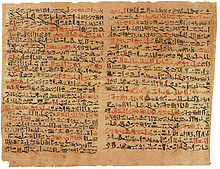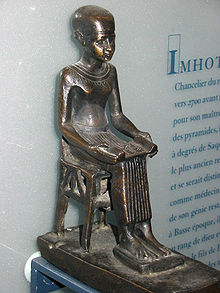- Medical literature
-
Medical literature refers to articles in journals and texts in books devoted to the field of medicine.
Contemporary and historic views regarding diagnosis, prognosis and treatment of medical conditions have been documented for thousands of years. The Edwin Smith papyrus is the first known medical treatise. Initially most described inflictions related to warfare. This was because war was the most important part of society and it was the most common way of contracting health problems.
Contents
History
Throughout history people have written about diseases, how human beings might contract them and what could be done to remedy it. Medicine ranged from folklore, witchcraft to the current Evidence-based medicine.[1][2][3] Among the most notable descriptions are texts from Egypt (Imhotep, Edwin Smith Papyrus, Ebers Papyrus, Kahun Gynecological Papyrus),[4] Mesopotamia (Diagnostic Handbook, Alkindus, De Gradibus), India (Ayurveda, Sushruta Samhita, Charaka Samhita), China (Yellow Emperor, Huangdi Neijing), Greece (Iliad and Odyssey are the earliest sources of Greek medical practise; Hippocratic medicine),[5] Persia (Rhazes, Avicenna, The Canon of Medicine, The Book of Healing), Spain (Abulcasis, Kitab al-Tasrif) and Syria (Ibn al-Nafis, Commentary on Anatomy in Avicenna's Canon, Comprehensive Book on Medicine).
Following Vesalius, William Harvey, Ignaz Semmelweis, Louis Pasteur, and others, the medical community have changed the way it conducts research. After incorporating the scientific method medical literature has introduced the so-called peer review, and is currently divided into journals and textbooks.
Medical journal
These are publications in which the medical community shares information. The common articles are original articles, reviews and case reports .
- Original articles describe methods, results, discussion and conclusions and a new research that conducted by the authors. Although according to the Evidence based medicine dogma the randomized controlled trials are the gold-standard for medical research, currently, they constitute only a minority of conducted research.
- Reviews are an overview of one particular topic of clinical interest in order to refresh the readers' memory, to enhance an emergence concept or the summary recent publications that haven't appeared in the textbooks yet. Other type of reviews are the systematic reviews and the meta-analysis in which a specific clinical dilemma is answered by collecting and summarizing all published data regarding this question.
- Reports of clinical cases of special interest of rare phenomenon or a new clinical method that was employed while managing the disease. However, currently most of the top-ranked medical literature do not published case reports as not being evidence based medicine. Thus data of rare medical situations, in which large randomized double-blind placebo-controlled trials can not be conducted, may not be published and data may be lost.[6]
When looking for specific information in any journal one can use the National Library of Medicine's PubMed database. Peer reviewed journals are ranked higher thus are a better source for medical information than non-peer reviewed journals. Examples of journals are:
- The New England Journal of Medicine
- The Lancet
- JAMA (Journal of the American Medical Association)
- Annals of Internal Medicine
- Nature Medicine
- BMJ (British Medical Journal)
- CMAJ (Canadian Medical Association Journal)
- Archives of Internal Medicine
Medical textbooks
After consensus has been reached it is incorporated in textbooks. There are textbooks on every medical specialty and they contain comprehensive discussion on all diseases and their diagnosis, therapy and prognosis. The first textbook to utilize experts to write specific chapters within the book was the Cecil Textbook of Medicine edited by Russell Cecil, MD in 1927. The book was an immediate international success because of the idea that single or double author medical books was outmoded, "since the scope of medical knowledge was far surpassing the capacity of any single individual to encompass." Since that time, this has been the standard. Examples are:
- Cecil Textbook of Medicine[7]
- Harrison's Principles of Internal Medicine[8]
- The Oxford Textbook of Medicine[9]
Medical journalism
Health-related information is often disseminated to the public via mainstream media outlets; these reports influence doctors, the general public, and the government. Most news articles fail to discuss important issues such as evidence quality, costs, and risks versus benefits.[10] Although medical news articles often deliver public health messages effectively, they often convey wrong or misleading information about health care, partly when reporters do not know or cannot convey the results of clinical studies, and partly when they fail to supply reasonable context.[11] Several web sites review medical journalism; examples include Health News Review in the U.S. and Media Doctor in Australia.[12]
Internet
Most prominent journals and textbooks are currently available on-line or via CD-Rom. Certain online services including Medscape and MDLinx offer aggregated digests of new articles from prominent medical journals.
See also
References
- ^ Medicine in Ancient and Medieval Times
- ^ MEDICAL HISTORY ON THE INTERNET
- ^ Asclepion, a World Wide Web page devoted to the study of ancient medicine
- ^ Medicine in Ancient Egypt
- ^ Medicine in Ancient Greece
- ^ Yitschaky O, Yitschaky M, Zadik Y (May 2011). "Case report on trial: Do you, Doctor, swear to tell the truth, the whole truth and nothing but the truth?" (PDF). J Med Case Reports 5 (1): 179. doi:10.1186/1752-1947-5-179. PMC 3113995. PMID 21569508. http://www.jmedicalcasereports.com/content/pdf/1752-1947-5-179.pdf.
- ^ Cecil Textbook of Medicine
- ^ Harrison's Principles of Internal Medicine
- ^ Oxford Textbook of Medicine
- ^ Schwitzer G (2008). "How Do US Journalists Cover Treatments, Tests, Products, and Procedures? An Evaluation of 500 Stories". PLoS Med 5 (5): e95. doi:10.1371/journal.pmed.0050095. PMC 2689661. PMID 18507496. http://medicine.plosjournals.org/perlserv/?request=get-document&doi=10.1371/journal.pmed.0050095. Lay summary – Guardian (2008-06-21).
- ^ Dentzer S (2009). "Communicating medical news—pitfalls of health care journalism". N Engl J Med 360 (1): 1–3. doi:10.1056/NEJMp0805753. PMID 19118299. http://content.nejm.org/cgi/content/full/360/1/1.
- ^ "False Hopes, Unwarranted Fears: The Trouble with Medical News Stories". PLoS Med 5 (5): e118. 2008. doi:10.1371/journal.pmed.0050118. PMC 2689669. PMID 18507502. http://www.plosmedicine.org/article/info:doi/10.1371/journal.pmed.0050118.
Categories:- Medical journals
- Medical manuals
Wikimedia Foundation. 2010.


